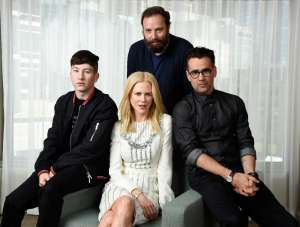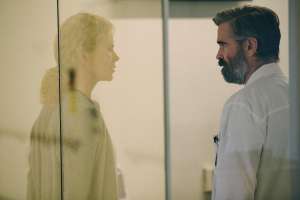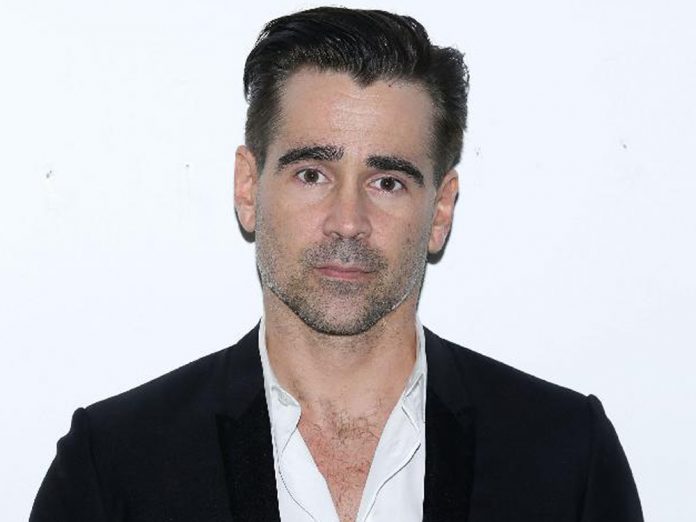[ad_1]
Running, nature hikes, hanging out with his kids: that’s what Colin Farrell does now in his spare time.
Farrell, 41, is a Hollywood phoenix of sorts, rebuilding his career over the last decade after his initial glam movie star life crashed and burned.
After his film debut in The War Zone in 1999, Farrell appeared in several high profile movies in quick succession — Minority Report, Phone Booth, Daredevil, S.W.A.T, Alexander, The New World and Miami Vice.
He was also in smaller fare, such as Veronica Guerin, Intermission and A Home at the End of the World, but the overall theme for the actor at the time appeared to be too much, too soon.
In 2006, he entered rehab.
Since then, the father of two sons has appeared in Horrible Bosses, In Bruges, Fright Night, Seven Psychopaths, Saving Mr. Banks, Miss Julie, Fantastic Beasts and Where to Find Them and The Beguiled.
He also starred in The Lobster, a film from director Yorgos Lanthimos that drew international attention.
Now with The Killing of a Sacred Deer, which opens today, Farrell undertakes his second starring role for Lanthimos. The film is an inky black comedy/drama with Farrell as a surgeon, Nicole Kidman as his frosty wife and Barry Keoghan as the teenager who’s going to turn their lives inside out.

Farrell plays a heart surgeon whose drinking habit has killed a man on the operating table; it catches up with him. The Killing of a Sacred Deer is a weird, wonderful Greek tragedy of a movie, but as always with Lanthimos, enjoying it is one thing and understanding it is quite another.
It’s a bit mystifying.
“Or perplexing. Or confounding,” says Farrell helpfully.
We spoke to the actor in Toronto at TIFF.
Yorgos Lanthimos says he wasn’t thinking of you when he wrote this, but your character has quite a fall from grace …
The breaking down is inflicted upon him. The walls of his comfortable arrogance, behind which he’s lived safely with his ideal family and his version of the American Dream, is something he’s not in any way really interested in assessing or changing. He’s just very comfortable living with his successes, as many people who have success are, from the outside looking in, anyway. But this tearing down of the structures of his life is something inflicted on him, born of a transgression from the past that’s just too karmically violent to move on from. Where that decision comes from I don’t know, the film never says.
I’m going to guess you met a few surgeons before playing one?
We met a couple. Yorgos sent me a gorgeous tape, 17 seconds of footage of a surgeon showing him around a hospital in Cincinnati where we ended up shooting. There was just something about the way that man moved. [Laughs] It was just beautiful, and very telling. It was both measured, and also almost anatomically disheveled, in that, he was in a rush, and yet in control while he was in a rush. The way he held his head! You can tell a lot just by observing.

What prompted you to start acting?
Maybe my sister. She went to theatre school in Dublin when I was 13 or 14. I wasn’t raised in a very cultured environment and I wouldn’t have even known that the studying of theatre or acting was something you could pursue in any kind of academic or structured way like that. I wouldn’t have even thought of it. I loved films when I was a kid — Indiana Jones and E.T. — but (director Wim Wenders’) Paris, Texas was a turning point for me. It was the first time I’d seen something that shook me up in a way, that kind of bypassed the sensorial parts of myself that even at age nine were about being pleased, feeling good, having nice experiences — it bypassed all those things into a kind of deeper place within me.
That film moved you that much?
I can’t begin to tell you how moving I found it when Harry Dean Stanton takes the chair and turns it around, because he can’t look at the woman when he’s telling her the story about the couple he was part of. He can’t look at her, so he turns the chair and says, ‘I knew these two people once, these two people,’ and he starts, and it’s some of Sam Shepard’s most beautiful writing.
And for me — of course, then I went back to Indian Jones — but seeing that film, that was something that really stayed with me.
Twitter: @LizBraunSun
[ad_2]








